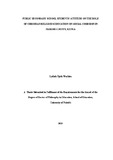| dc.description.abstract | The purpose of this study was to investigate the students’ attitude on the role of
CRE in the promotion of social cohesion. The study was guided by four objectives
related to students’ characteristics, categories of schools and parental background.
These objectives were supported by corresponding hypotheses. Review of related
literature covered various themes such as the concept of attitudes, students’
characteristics and social cohesion, parental factors and social cohesion, institutional
factors and social cohesion. The research design used was descriptive survey which
employed both quantitative and qualitative approaches. The study was conducted
among Form four CRE secondary school students in Nairobi County, some of their
teachers and a few education officers in the County. The target population was 5550
CRE students, 160 CRE teachers and 8 education officers. From this population a
sample of 550 CRE students, 25 CRE teachers and 4 education officers participated
in the study. The questionnaire was the main tool used for the students while
interviews were used for teachers and education officers. The research findings were
analysed both quantitatively and qualitatively. The quantitative data was processed
and analysed with the help of the SPSS software programme and summarised into
frequency tables and percentages. Qualitative data was subjected to content analysis
from which relevant information was extracted. The hypotheses were tested at 0.05
level of significance. The study found that CRE is perceived as an important tool in
the promotion of social cohesion. It was further established that students’ age
(p=0.030) and the type of school attended (p=0.010) displayed a significant level of
influence on their attitude on the role of CRE in social cohesion. It was further
established that mothers’ and fathers’ level of education was significant at p=0.030
and p=0.042 respectively. However, the students’ gender, ethnicity and their parents’
occupation did not have such significant influence. The following are some of the
recommendations the study made; enhancing CRE, strengthening its teaching
methods for social cohesion and integrating the teaching of religious values across all
the subjects in the curriculum. Among the recommendations for further research is
replicating the study in other counties and having a comparative study between rural
and urban Counties with a view of finding out if the results would remain the same
given the fact many rural counties are occupied by people belonging to one ethnic
group while Nairobi is cosmopolitan. | en_US |

